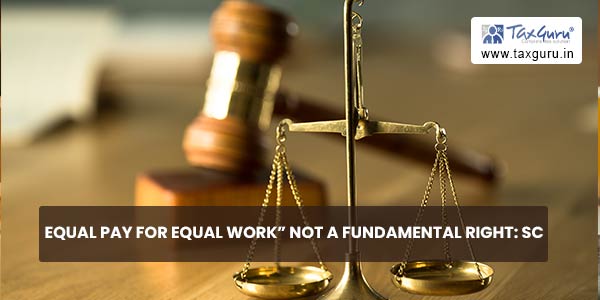Case Law Details
State of Madhya Pradesh Vs R.D. Sharma (Supreme Court of India)
It may be noted that Supreme court has consistently held that the equation of post and determination of pay scales is the primary function of the executive and not the judiciary and therefore ordinarily courts will not enter upon the task of job evaluation which is generally left to the expert bodies like the Pay Commissions. This is because such job evaluation exercise may include various factors including the relevant data and scales for evaluating performances of different groups of employees, and such evaluation would be both difficult and time consuming, apart from carrying financial implications. Therefore, it has always been held to be more prudent to leave such task of equation of post and determination of pay scales to be best left to an expert body. Unless there is cogent material on record to come to a firm conclusion that a grave error had crept in while fixing the pay scale for a given post, and that the court’s interference was absolutely necessary to undo the injustice, the courts would not interfere with such complex issues. A beneficial reference of the observations made in this regard in case of Secretary, Finance Department Vs. West Bengal Registration Service Associations and Ors. 1993 Supl. 1 SCC 153 be made. As held in State of Haryana and Anr. Vs. Haryana Civil Secretariat Personal Staff Association 2002 (06) SCC 72 ‘equal pay for equal work’ is not a fundamental right vested in any employee, though it is a constitutional goal to be achieved by the Government.
Pertinently the Administrative Tribunal after considering the relevant factual and legal aspects had rightly rejected the claim of the respondent no. 1 for granting the apex scale on the basis of “equal pay for equal work” in the O.A. filed by him. The said well-considered, just and proper order of the Tribunal was wrongly set aside by the High Court on extraneous grounds applying the principle of “equal pay for equal work”, while exercising the power of superintendence under Article 227 of the Constitution of India. It is well-settled legal position that the power under Article 227 is intended to be used sparingly and only in appropriate cases for the purpose of keeping the subordinate courts and tribunals within the bounds of their authority and not for correcting mere errors. In the instant case, the Tribunal had not committed any jurisdictional error, nor any failure of justice had occasioned, and hence the interference of the High Court in order passed by the Tribunal was absolutely unwarranted.

FULL TEXT OF THE SUPREME COURT JUDGMENT/ORDER
Please become a Premium member. If you are already a Premium member, login here to access the full content.



